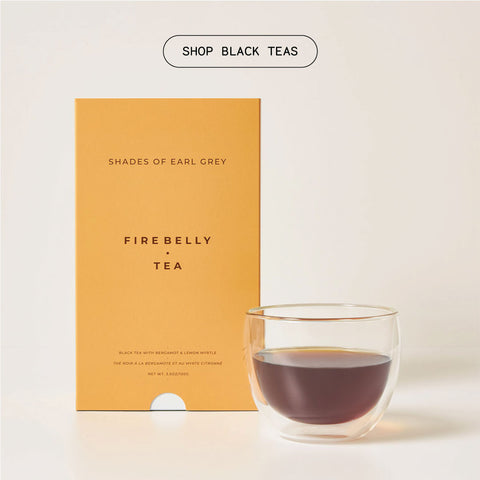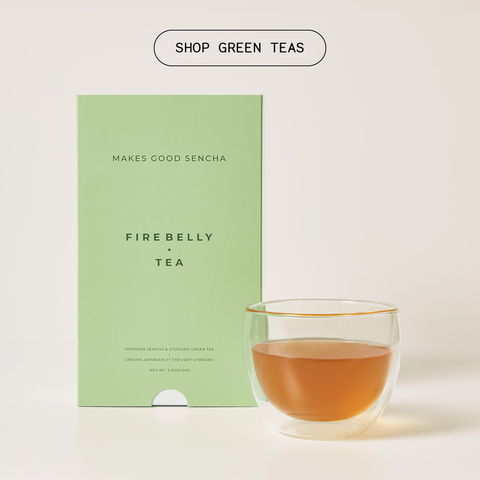Nothing kickstarts a morning like a hot caffeinated beverage. Both tea and coffee drinking are rituals millions of people worldwide participate in. For some, it's a jolt from a freshly brewed cup of coffee, but for others, it's a cup of tea that gets them going.
There's been a long-standing debate over which one delivers the highest amount of caffeine. In this article, we're putting coffee vs. tea, putting the two head to head to see which one throws the most caffeinated punches. We'll also compare some of the reported health benefits of tea vs. coffee. So sit back, put the kettle on and boil some hot water, or start the coffee maker, if you must, and let's see which one has more caffeine.
How Much Caffeine is There in Black Tea Anyway?
If you've ever wondered which has more caffeine, coffee or tea, coffee is usually always at the top of the list, but that might not always be the case. It all depends on the type of coffee you consume. Espresso and coffee are not the same things, and tea is available as black tea, green tea, white tea, oolong tea, and herbal tea. Comparing the caffeine content of tea vs. coffee might be complex when considering all of those options.
Brewing a cup of black tea or oolong tea is much different from brewing herbal tea. Things like brewing and steeping times, whole-leaf tea or bags, or the water temperature are all factors that affect the levels of the natural stimulants released.
Black and oolong teas typically steep the longest and use the hottest water. When properly brewed, these teas release around 50mg of caffeine for an 8-ounce cup. While green tea releases around 30 to 50 mg of caffeine, white tea releases only 20 mg of caffeine per cup.
These figures represent an average using a specific amount of tea, like in a tea bag. However, these numbers can change dramatically when you brew tea using whole-leaf tea. And brewing a tea like matcha changes the caffeine game even more. With up to 100mg of caffeine per teaspoon of matcha powder and barely any steeping time, this drink offers a nice boost to the system.
What About Green Tea?
When it comes to coffee or tea, many coffee drinkers stand by their morning coffee to help them get through the early morning hours. But too much caffeine right away isn't always a good thing. It can make a person anxious and even cause an irregular heartbeat and, in some cases, cardiac arrhythmia. Green tea is an excellent alternative for those who want caffeine but have no side effects.
Green tea, like matcha, contains an amino acid called L-Theanine, which helps prevent the adverse side effects of caffeine. It delivers a boost of energy along with a calming effect. Green tea, like matcha, also provides a healthy amount of antioxidants. Antioxidants are molecules found in foods like green tea, which assist the immune system in fighting free radicals in your body.
At nearly 100mg of caffeine in a teaspoon of matcha powder, a tea drinker is sure to get their caffeine intake without the caffeine shakes. If you're a coffee drinker and want to switch it up, try green teas like matcha tea. You'll get a new taste sensation and enough caffeine content to satisfy even the most dedicated coffee drinker.
The Coffee Caffeine Comparison
Starting the day with a cup of coffee has been a long-standing tradition in the west. These days, you can order everything from a mochaccino, cappuccino, frappuccino, macchiato, mocha, espresso, and of course, a latte.
These coffee concoctions will drastically alter the level of caffeine in the drink. Other factors, such as brewing times, the type of beans used, and the amount of roasting the beans go through, and all affect caffeine levels.
In the US, very few people drink only one 8-ounce cup of coffee daily. Many popular coffee shops serve a 12-ounce coffee as their "small" coffee, and a medium roast coffee of that size contains about 235mg of caffeine. This is more than half the recommended daily amount of caffeine which is 400mg, and one shot of espresso contains roughly 75mg.
Between coffee and tea, a strongly brewed coffee is clearly going to give you more caffeine, that much-needed jolt, and a stronger kickstart to your day. However, tea wins for a steady, gentle energy boost of caffeine. It provides just the right amount of caffeine that a tea drinker can drink throughout the day without the unnecessary jitters.
Are There Any Health Benefits to Caffeinated Beverages?
Drinking strong coffee vs. tea may give you a bigger blast of caffeine, but let's break down some of the health benefits of tea vs. coffee. Both coffee and tea have many health benefits - more than just being a powerful stimulant. Before introducing tea and coffee into your daily routine, speak to a doctor to see if it will affect your health or any prescription medications.
Black Coffee Health Benefits
When it comes to coffee vs. tea, coffee delivers more caffeine. However, are there health benefits to drinking a cup of freshly brewed coffee? As one of the more popular beverages available worldwide, let's see how coffee vs. tea can help a person fight chronic diseases, lose weight, improve cognitive function, and more.
#1. Boosts energy levels
We already know that caffeine in coffee boosts the central nervous system and can fight off fatigue, and there's a good reason for it. Caffeine blocks the receptors of a neurotransmitter called adenosine.
When this happens, other neurotransmitter levels in the brain also increase, like dopamine. One study found that increased caffeine before playing golf improved the golfer's energy levels and performance.
#2. Lower risk of type 2 diabetes
One review of 30 studies found that consuming one cup of coffee daily lowered the risk of developing type 2 diabetes by 6%. The study's findings suggest that coffee helps preserve the function of the beta cells in the pancreas, where insulin is produced to regulate blood sugar levels.
#3. Better mental health
Study results are mixed, but some research suggests that coffee may help protect against chronic diseases like Alzheimer's and Parkinson's and improve cognitive function. One review of 13 studies found that people who consumed coffee regularly had a lower risk of developing Parkinson's disease. Another review of 11 studies with over 29,000 participants found that increased coffee consumption lowered the risk of developing Alzheimer's disease.
#4. Weight Loss
All those claims that coffee helps a person with weight loss may have some truth. According to research, coffee may alter fat storage and support gut health, aiding in effective weight loss. One review of 12 studies showed that the more a person consumed coffee, the more weight they dropped.
#5. Better heart health
Drinking coffee may have some heart health benefits. One research study found that consuming three to five cups of coffee daily had a 15% reduced risk of heart disease. Another study indicated that drinking three to four cups of coffee daily reduced the risk of stroke by 21%. Coffee affects blood pressure levels, and it is essential that people with blood pressure problems carefully monitor their caffeine intake.
Black Tea Health Benefits
Black teas, white teas, green teas, and oolong teas come from the same tea plant, the Camellia Sinensis plant. This plant also produces other black tea blends like Darjeeling tea, English Breakfast tea, Earl Grey tea, and Lady Grey tea. The black tea caffeine content will vary widely depending on which blend you drink and how the leaves are harvested and processed.
For example, black teas are made with mature tea leaves that go through the most processing to achieve that dark and robust flavor. White and green tea go through less drying and processing, giving tea drinkers a light and earthy green-colored cup of tea. Are there some benefits to drinking tea vs. coffee? Let's look at the health benefits of tea consumption.
#1. It has antioxidant properties
The polyphenols found in tea include catechins, thearubigins, and theaflavins which are the primary sources of antioxidants known to provide better overall health. One study in rats found that these antioxidants in black tea helped reduce inflammation, cholesterol, and blood sugar levels.
While coffee may contain more antioxidants, drinking too much coffee with high levels of caffeine can alter the antioxidants you'll be getting. With teas like black, oolong, green and white, tea drinkers will get higher levels of antioxidants because of how the tea leaves are processed.
Drinking a cup of matcha provides a high level of antioxidants because the tea leaf powder is consumed rather than thrown away. When it comes to tea vs. coffee for antioxidant levels, the processing methods of coffee beans and tea leaves play a significant role in how much you'll get in your cup.
#2. better heart health
Along with polyphenols, black tea contains a group of antioxidants called flavonoids. Research suggests that regularly consuming black tea may be instrumental in helping reduce the risks associated with heart disease, high blood pressure, high cholesterol, and obesity. One study found that when a person regularly consumed a cup of black tea, participants showed a 4% lower risk of stroke and death from heart disease and a 2% lower risk of a heart attack.
#3. Lowers LDL cholesterol
If the body has too much LDL, it can create a build-up in the arteries called plaque, restrict blood flow, and cause problems like heart failure or stroke. Some studies show that drinking tea may help reduce LDL cholesterol in the body. One study found that consuming black tea helped reduce LDL levels reducing the risk of heart failure.
#4. It may help reduce the risk of cancer
The polyphenols found in black tea may be responsible for slowing the development of certain cancers and helping with cancer cell death. One review of studies found that the effects of drinking tea helped lower the risk of oral cancer.
Another study found that participants drinking green tea had a 22% lower risk of developing endometrial cancer. Although drinking black tea should never replace traditional treatments, more research is underway to explore this potential health benefit further.
#5. Improves focus
Like coffee, tea contains caffeine and the amino acid L-theanine, which may help improve focus and alertness. L-theanine increases alpha activity in the brain, giving the person better focus and mental clarity. Both beverages, coffee, and tea, have L-theanine, and both deliver the same results. However, tea drinkers will have more steady energy throughout the day than those who drink coffee and feel a quick burst and then a crash.
Conclusion
Both tea and coffee deliver on the caffeine front, but the two beverages are drastically different regarding the amount of caffeine each drink offers. Black tea caffeine is a steady and slow stream without the typical caffeine buzz. Coffee gives you a quick caffeine buzz and a burst of energy, but it soon fades.
Is it possible to drink too much tea and coffee throughout the day? Coffee will give you more caffeine than your body needs, and when it comes to tea vs. coffee for the caffeine content, a regular cup of tea will be gentler on your system and still give you all of the beneficial compounds.
Is coffee or tea healthier? One beverage isn't necessarily more nutritious than the other, but it depends on how much you drink. When it comes to coffee vs. tea for caffeine, go easy on coffee and energy drinks. They both contain more caffeine than tea and can create some adverse effects in your system. So if you're considering joining one of the millions of tea lovers out there, here are some great loose-leaf teas worth checking out.


